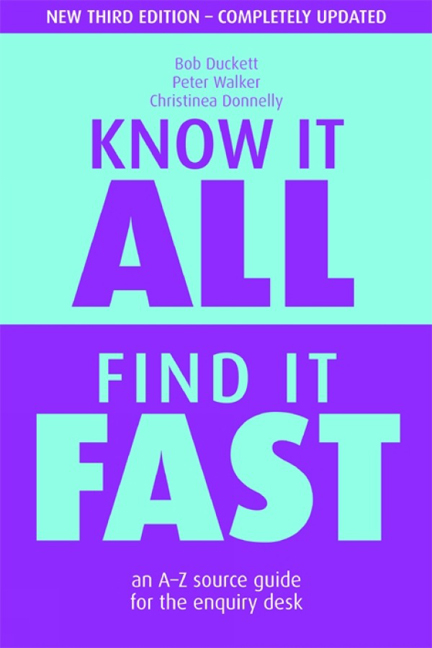Book contents
- Frontmatter
- Contents
- Introduction to the first edition
- Introduction to the second edition
- Introduction to the third edition
- GENERAL SOURCES
- ABBREVIATIONS & ACRONYMS
- BANKS & BANKING
- CANALS & WATERWAYS
- DATES, CALENDARS & ANNIVERSARIES
- EDUCATION – GENERAL
- FAIRY TALES & NURSERY RHYMES
- GAMES RULES (INCLUDING SPORTS)
- HEALTH & HEALTHCARE
- INFORMATION TECHNOLOGY
- JOBS
- KINGS & QUEENS, RULERS & HEADS OF STATE
- LANGUAGES & TRANSLATING
- MANUFACTURING
- NAMES
- OPTICIANS
- PARISH REGISTERS
- QUOTATIONS & SPEECHES
- RAILWAYS
- SAINTS
- TAX
- Unexplained, The
- VOLUNTEERING
- WEATHER
- Index
Introduction to the first edition
Published online by Cambridge University Press: 08 June 2018
- Frontmatter
- Contents
- Introduction to the first edition
- Introduction to the second edition
- Introduction to the third edition
- GENERAL SOURCES
- ABBREVIATIONS & ACRONYMS
- BANKS & BANKING
- CANALS & WATERWAYS
- DATES, CALENDARS & ANNIVERSARIES
- EDUCATION – GENERAL
- FAIRY TALES & NURSERY RHYMES
- GAMES RULES (INCLUDING SPORTS)
- HEALTH & HEALTHCARE
- INFORMATION TECHNOLOGY
- JOBS
- KINGS & QUEENS, RULERS & HEADS OF STATE
- LANGUAGES & TRANSLATING
- MANUFACTURING
- NAMES
- OPTICIANS
- PARISH REGISTERS
- QUOTATIONS & SPEECHES
- RAILWAYS
- SAINTS
- TAX
- Unexplained, The
- VOLUNTEERING
- WEATHER
- Index
Summary
Answering questions from its users is one of the most important services undertaken by a library's staff. Yet it is also one of the most difficult, least understood, and most neglected of subjects. Despite years of working in reference libraries, information units and subject departments, the lack of help we frontline staff get to assist people with their enquiries is a constant source of amazement and irritation. And puzzlement. How do you train staff to answer questions? Manuals on question answering techniques – the social and psychological aspects – there are a-plenty. Lists of recommended reference books are also common. Courses on government publications, law reports, online searching and other specialist literatures and search techniques exist. These can help, of course they can, but all too frequently the questions fired at us out of the blue have not been covered on a course. And the majority of staff on enquiry desks do not have formal library qualifications and have not been on courses. And there is a queue, the phone is ringing unanswered, the photocopier has jammed, and your inquisitor is waiting impatiently for an answer. You are stressed and you can feel the panic rising. Few outsiders can understand the terror experienced by staff newly placed on public enquiry counters. Few of us who have been there will ever forget those early experiences.
What is needed is a guide that staff can use to know where to find the answers, and quickly! Hence this book. We hope it will help.
This book is intended as a first point of reference for library staff unfamiliar with the subject of the enquiry. It is aimed at general library staff and no prior knowledge is assumed. It is an A to Z because this is the quickest way to find a subject. Some typical questions are given to indicate the nature of the subject. Then follow a few background comments that will assist the member of staff to clarify the nature of the enquiry; before one can find an answer it is important to have asked the right follow-up question or questions to make sure the questioner and the questioned understand each other. Then come a few of the more commonly available sources that may help to answer the question. These include printed sources, electronic sources (mostly free websites), and some useful contacts for referral purposes.
- Type
- Chapter
- Information
- Know it All, Find it FastAn A–Z source guide for the enquiry desk, pp. xi - xiiPublisher: FacetPrint publication year: 2008

